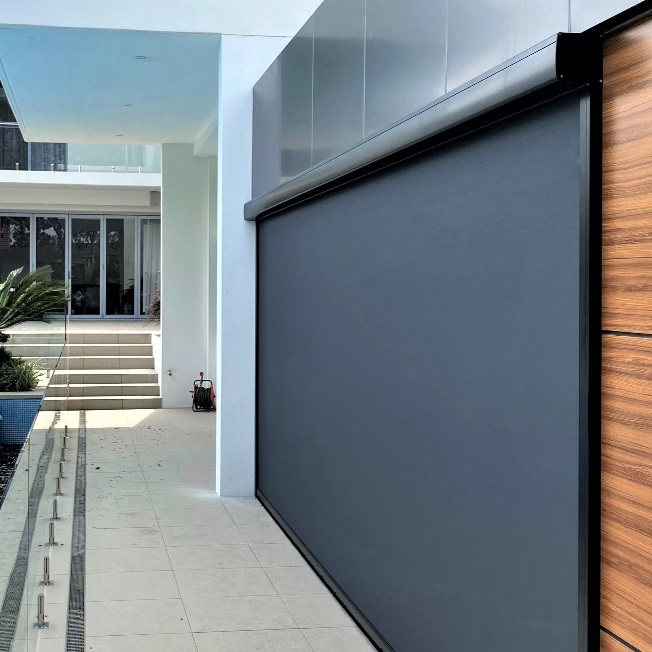Morris Moniz has one piece of advice: “Please plan ahead.” The retail operations manager at SAL is always amazed at the number of people who rush into the store the day before a hurricane, when it’s been on the radar for a week.
While Bermuda homes have a reputation for being strong, their weak points are large surface areas, such as picture windows or sliding glass doors, and porches. “When the wind hits at the right angle, it gets underneath those covered porches and tends to either bring down the ceilings or lift the slate,” says Moniz.
Unprotected windows and doors are also a weak point and there is a reason why Bermudian homes traditionally have window blinds or shutters. As long as they are well maintained and closed properly, they work well. “We would recommend placing shutters on windows to protect against flying projectiles and using roller shutters or plywood to protect bigger sliding doors,” says Stephen Muso, BF&M’s head of personal lines. He says the insurance company’s most common post-hurricane property-related claims are roof and shutter damage as well as damage to property caused by patio furniture being left outside and unsecured.
Plywood is SAL’s best home protection seller before a hurricane, followed closely by tarpaulins. Moniz recommends having tarpaulins on hand in case you do lose part of your roof. “You can get up there quickly once the bad weather subsides and at least keep the water out of the house,” he says.
He says plywood is very effective at protecting windows and large doors from flying objects. This is also the case even if you have “hurricane strength” windows because you never know what could slam into them at great speed.
“A lot of hurricane-proof windows will still break or shatter, but they won’t collapse all the way in,” he warns.
Plywood is sold in 4×8 sheets and if you have planned in advance, his team can help cut it down to size. The day before however, they may struggle to help everyone if they are swamped with customers.
Moniz also advises that as long as plywood is stored under cover, it can be reused year after year, with the added benefit that you will always have the screw holes in the right place. The most popular screws for securing plywood are Tapcon screws, which SAL also sells.
While plywood will do the job well, Moniz has roller shutters and blinds on his own house. “I can prepare my house quickly so that I can be on the job to help others who do it differently,” he says. “It takes me 10 minutes to get my house ready.”
To protect an undercover porch or, as an alternative to shutters and plywood over windows and doors, there are a number of screen systems available. Bermuda Brickyard sells three systems—Armor Screen, Croci and Progressive—all of which are Florida building code or the stricter Miami-Dade approved systems.
“Under the Miami-Dade conditions, they say if there’s glass behind this and something hits the screen, the glass can’t break,” explains Bermuda Brickyard project manager, Andrew Butt.
So, which screen system offers the best hurricane protection?
The easiest system, he explains, is the electric roll-up: “Press a button and they go up and down.” All three manufacturers offer electric roll-ups with the same grade of hurricane protection, but aesthetics and materials vary.
The Progressive system is better looking and better engineered, says Butt, adding, “they’re slightly more expensive.” The Croci system is aluminium so there is no deflection, which provides extra protection when it’s right in front of glass and also makes a property more secure. It’s an added bonus if you aren’t going to be in it during the hurricane but it is noisier.
The material used in the Progressive and Armor Screen systems allows objects to bounce off them, he continues. “It’s resilient, so if something hits it when it’s deployed, it will bounce off. That’s one of the advantages of material-based hurricane screens over solid plywoods or rigid plastics. If something hits those hard, it could crack or damage them. The material ones, because they can give and rebound, will throw the item back off it.”
A more cost-effective screen option, albeit a more labour intensive one, is a manual system, known as a “buckle and strap,” which only Armor Screen offers. These have the added benefit of no permanent boxes or tracks on the outside of your home and can be taken down and stored relatively easily. Ideal for covered porches, they can also be used to protect windows and doors.
To make it the Miami-Dade standard, however, window screens need a bar to be fixed between the screen and the window to protect the glass from projectiles; the door screens come out at an angle for the same reason. For the latter, a zip option makes it easy to go in and out.
While all these screen systems meet the toughest hurricane protection standards, Butt points out, however, that “any system is only as strong as what it’s attached to,” and herein lies more advice from BF&M.
“Regular maintenance and upkeep of the structure of the home is also important,” says Muso. “Unfortunately, there are homes in need of repair, which would make the property more vulnerable during a storm.”
Making sure your insurance is up to date is also vital for home protection in advance of hurricane season. It’s not something you want to be doing while moving heavy outdoor furniture and pots inside, closing up your house, and stocking up on all other hurricane essentials.
“Preparation is the key to ensuring your property is secure so we always recommend clearing your yard, moving your vehicle and boat to a safe location, and always checking your insurance policies to ensure that everything is up-to-date,” Muso says.

